
Using aluminium to make things that are used daily is economical, safe and environmentally sound. Therefore, since its inception some 80 years ago, ZARGES has been committed to manufacturing innovative products that are mainly made of this unique light metal.
The advantages of aluminium, described in more details below, make it possible to create an exceptionally wide range of product solutions. ZARGES divides its aluminium products into access equipment and logistics equipment.
Did you know?Aluminium is the second most-used metal after steel. Aluminium is considered the most-common metal in the earth's crust. Aluminium the third most-common chemical element on earth after oxygen and silicon.
The advantages of aluminium
Aluminium is ligth and highly sturdy
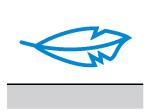
The density of aluminium is approx. 2.6 to 2.8 g per cm³. This is approx. one third of the density of steel, which is why aluminium is also called a "light metal". Despite its low weight, aluminium has a very high strength.
Its weight advantage is also useful in the transport industry, a sector in which ZARGES transport cases are an established name. The material's low weight and high sturdiness are also important characteristics when it comes to aluminium access aids.
Aluminium can be processed in a wide variety of ways
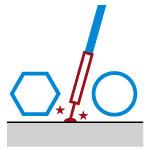
All standard processing methods – welding, moulding, etc. – can be applied to aluminium and are much more efficient to carry out on aluminium than other metals.
ZARGES makes use of these advantages to manufacture innovative and durable aluminium products for a wide range of applications.
Aluminium is impact-resistant and extremely strong

Even though the surface of an aluminium sheet may become dented by the force of an impact, the impact energy is absorbed by the deformation.
This property is important for almost all ZARGES products. It makes them durable and extremely long-lasting even under harsh conditions.
Aluminium is corrosion-resistant and protects itself
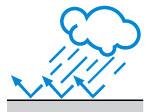
When aluminium comes into contact with oxygen in the air, a dense oxide layer forms on the aluminium surface. This layer will immediately reform when it gets damaged and also protects the metal underneath against corrosion.
For particularly high-stress conditions, the surface protection can be improved even further by means of anodisation.
This material property contributes significantly to the long service life of ZARGES products.
Aluminium is fully recyclable
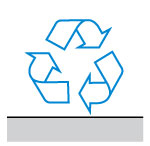
Products made of aluminium are very sturdy and long-lasting.
Extracting aluminium is an energy-intensive process. However, used aluminium can be easily melted down and fully recycled. This recycling process consumes only 5% of the energy used in aluminium extraction! The aluminium melted down/recycled is in no way inferior to primary aluminium.
Aluminum is electrically conductive
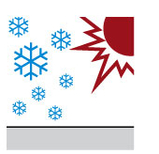
Its material properties remain unchanged in the temperature range from -80 to +150°C. Aluminium can even withstand extreme temperatures without detrimental effects to its properties. In extreme cold, aluminium will even become tougher and harder!
This property is the reason why ZARGES cases are a popular choice for extreme applications and why the company's ladders and scaffolding are relevant for certain groups of customers.
Aluminium is vapour-impermeable
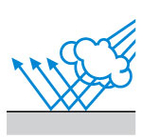
Moisture cannot diffuse through the metal even when an aluminium case is stored for a long time. When welded, an aluminium container can be made impermeable to water vapour in order to protect the goods packaged inside against humidity or water spray.
This advantage comes into play for ZARGES aluminium cases, which can be used in an extremely wide range of applications.
Aluminium is resistant to UV radiation
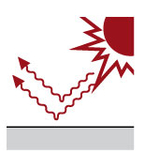
Long periods of storage and use under exposure to UV radiation have no effect on this material.
ZARGES cases demonstrate these advantages, for example, when used in expeditions and for transporting goods in countries near the equator. Likewise, products such as ZARGES ladders and scaffolding are perfectly designed for tough outdoor applications.
Aluminium is hygienic
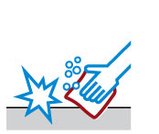
The smooth surface of aluminium is easy to clean and odourless. Aluminium is therefore suitable for use in sterile and pathogen-free environments.
Choose ZARGES products for places with high hygiene requirements, such as laboratories, hospitals and food processing facilities.
Aluminium is magnetically neutral
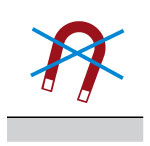
Aluminium is not ferromagnetic. For certain places of application, e.g. in laboratories, this material property can be of significant importance.
ZARGES cases are very well suited for packaging and transporting sensitive electronic goods.
Aluminum is electrically conductive
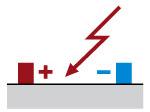
Aluminium is a good conductor of electricity – for example, did you know that aluminium is the most-used material for power lines?
Aluminium is also a good conductor of heat; this is advantageous for housings of electronic components, for example.
The material's electrical conductivity is relevant to sensitive electronic components, which have to be packaged under antistatic conditions.
Surface finishing of aluminium
- Powder-coated aluminium: During the aluminium coating process, one or several layers of powder coat are electrostatically applied on the substrate. The coating offers protection against wear and corrosion and can also be used to alter the non-stick property, smoothness or heat-insulating property of an aluminium workpiece.
- Anodised aluminium: Aluminium finishing has been perfected in electrolytic oxidation of aluminium (anodisation). Hardly any other process better protects aluminium against wear and corrosion. Anodisation results in an extremely hard and scratch-resistant surface that reliably protects against corrosion. Unlike pure aluminium, the anodised layer is not electrically conductive.